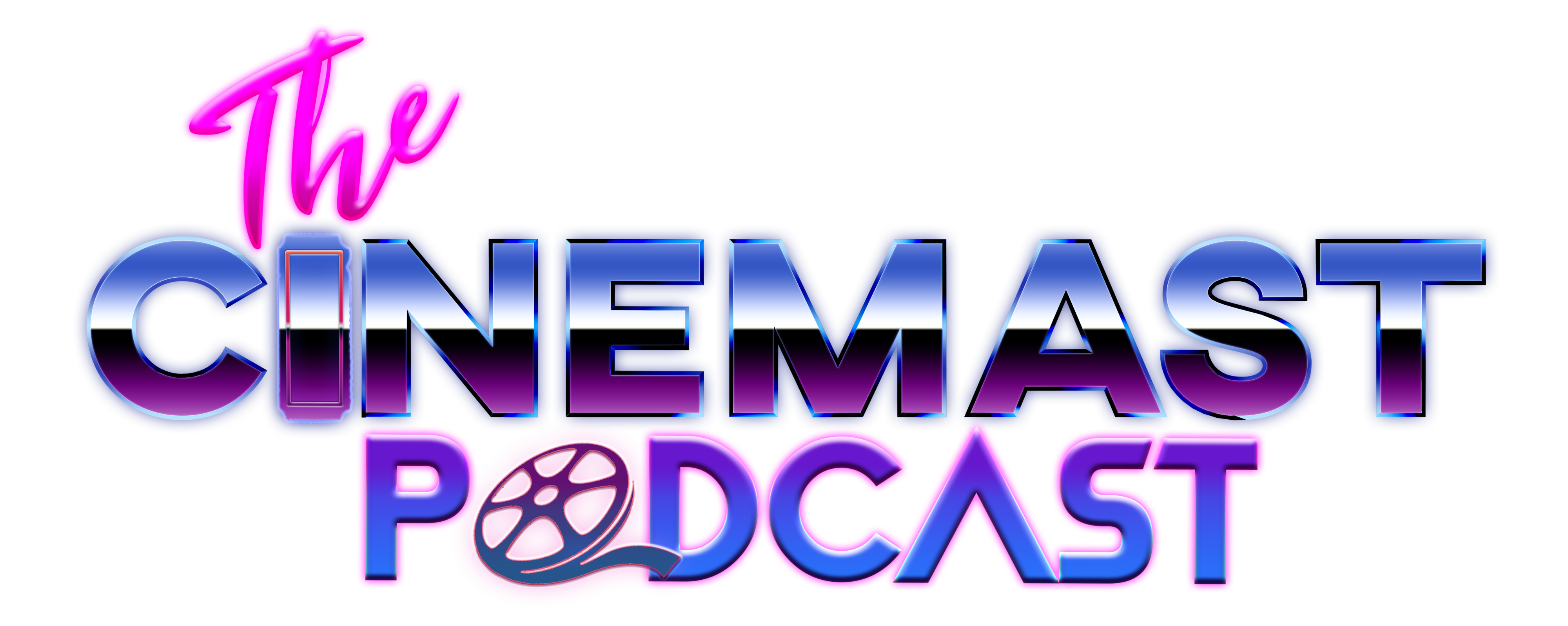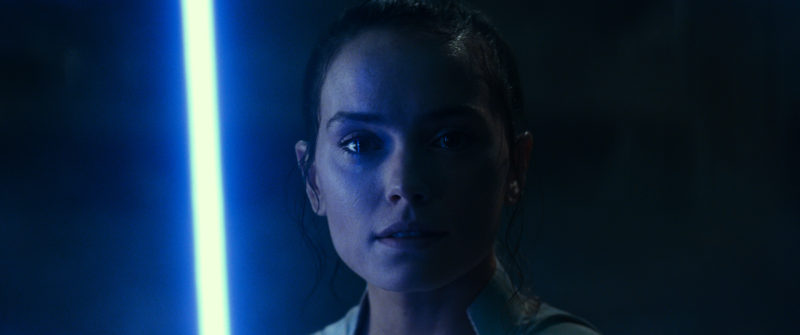
A few years ago, my brother and his friend came down from college to stay with me for a weekend. Wanting to be hospitable, but also have a good time, I went out and bought some aged ribeye steaks for about $25 each. I cooked these steaks to perfection–a juicy medium-rare. I dished the steaks out and headed to the bathroom, but when I came back, my brother’s friend had taken his steak and DOUSED it in ketchup.
It hurts right? It’s painful to imagine something so well-crafted covered up with lousy, cheap cover-up in order to “fix” the flavor. So here’s the truth:
Regardless of how one feels about the choices made in Rian Johnson’s Star Wars: The Last Jedi, Johnson left Star Wars in Abrams’ hands with a largely blank slate. Yes, Snoke is gone, but now Kylo Ren is in an even better villainous position as Supreme Leader. Luke Skywalker is dead, but he ended The Last Jedi as the legend we all wanted him to be, realizing the value of the Jedi in the galaxy and passing the tradition on to Rey. The Resistance was in shambles, but it could only go up from there.
Rian Johnson served us a juicy steak, teeming with expanded Star Wars lore, deep character journeys, greater context on the entire saga as a whole, and huge creative swings. But with Star Wars: The Rise of Skywalker, JJ Abrams seems to have squirted ketchup all over it in order to make the challenging nature of The Last Jedi more palatable and turn this trilogy into something else entirely–to negative effect.
Making attempts to paint over some of the brush strokes of The Last Jedi is fine, and something that would have been welcome in some cases, had it been done well. But the flavor of something far better is still present in The Rise of Skywalker, but it’s clear that someone is trying to cover it up.
The Rise of Skywalker, however, is a fun trip to the Star Wars galaxy. It’s fun being back with these characters on another adventure and it’s fun to have them all together. The idea of “the trio sticking together” in Star Wars is a misconception–Han, Luke, and Leia hardly spend any time together outside of A New Hope and somehow, Anakin Skywalker, Obi-Wan Kenobi and Padme Amidala get labeled the prequel trilogy somehow–but it is fun watching Poe and Rey bicker with Finn breaking it up while C-3PO just goes full C-3PO, even if the film does nothing to push any characters, outside of Rey and Kylo Ren, to grow.
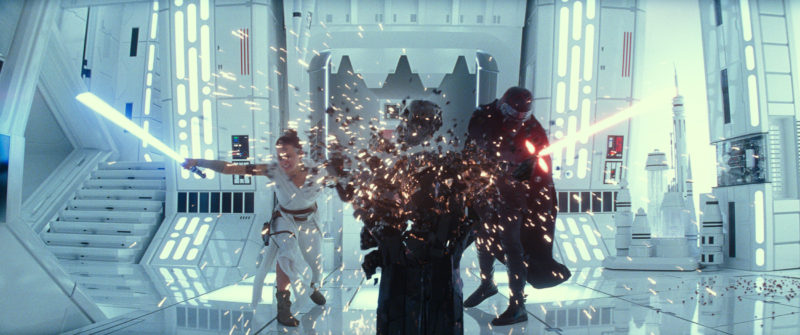
One of the best parts of The Rise of Skywalker and an element of The Last Jedi that Abrams actually takes and improves on is the Rey/Kylo dynamic. It is expanded further and now the two of them are able to interact further via their “Force connection”, leading to some extraordinary moments that are some of the best surprises in the film, including a very creative lightsaber battle. Daisy Ridley and Adam Driver have fantastic chemistry and watching them interact is a delight. I’ve loved watching these two over the last few films and watching their story culminate in The Rise of Skywalker was the film’s highlight, even if the choice to deliver some of the film’s most important dialogue through the Kylo Ren mask was a misstep.
The film introduces some new characters as well into the ever-expanding canon of who’s who in the Star Wars universe. Droid D-O and Babu Frik are the two smallest of new characters, and both extraordinarily cute. Keri Russell’s Zorii Bliss is a mildly interesting character that exposes some more of Poe’s backstory, but the real star of the incoming characters is Allegiant General Enric Pryde, played by Richard E. Grant. In fact, Grant is so good as Pryde, that I’m a little disappointed that he wasn’t introduced earlier. He’s menacing, cunning, and downright Tarkin-esque.
But as I mentioned previously, the film has a lot of the necessary pieces to be a great Star Wars movie, but some major issues keep it from reaching its full potential.
The pace of the film is incredibly rushed, particularly the film’s first 25 minutes, but it’s almost to be expected with everything that Abrams is trying to cram into the runtime. He’s not just wrapping up a movie, or a trilogy, he’s wrapping up an entire saga. It’s a pretty unenviable task, closing out this saga, and Abrams relies heavily on nostalgia in order to do so, reaching into the past to pull moments and references from the previous 8 films to tie this one together. Much of the nostalgic returns to older films work well, but the film is too reliant on the past, rather than making a footprint for itself by moving forward.
And here is the main issue with The Rise of Skywalker. Put simply, JJ Abrams is too stuck in the nostalgia of the original trilogy, that he can’t quite pull his Star Wars movies out of their shadow. Cameos from characters and ships that you’ve seen before during Star Wars cartoons, books and comics all make an appearance to make you say “wow this feels complete.” But really it’s a simple band-aid for Star Wars fans that seem to only want the same 6 movies rewatched, recycled, repackaged and spoon-fed to them. There are a few instances where you can see that Abrams is pulling out some real solid Star Wars lore (the Jedi voices from film and TV that Rey hears at the film’s climax is a perfect example), but most of it is dying to return to the past rather than move forward.
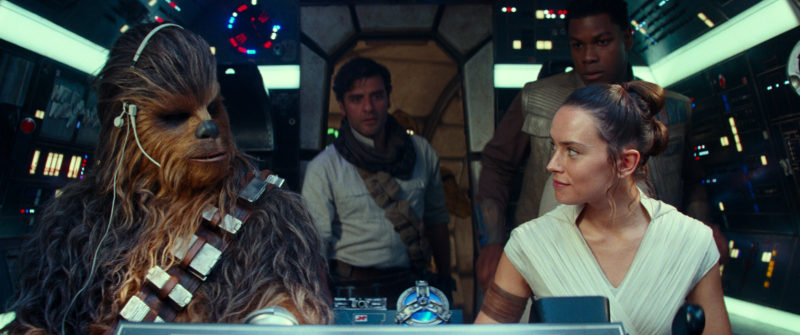
Throughout Abrams’ career, he has proven himself an expert in setting up mysteries and questions that make the audience want to stick around. Look at pretty much anything he’s ever done. But we never really get to see Abrams complete any of his puzzles. He leaves nearly every long-term project that he starts, so The Rise of Skywalker was a real opportunity for him to stick his landing, regardless of whatever The Last Jedi did. But The Rise of Skywalker shows that when it comes to solving those puzzles, JJ takes the easy way out rather than finding a compelling and surprising answer.
Frustratingly, The Rise of Skywalker has the potential to be whatever Abrams wants it to be, but instead of something new, Abrams falls back into familiar territory with planet destroyers, a completely unnecessary return of Palpatine and backtracking on controversial elements of The Last Jedi. It’s clear that Abrams has had his ear to the ground on what the complaints are from the previous two films, and rather than write compelling reasons to answer those criticisms, he and co-writer Chris Terrio just seems to have written those away at the cost of developing characters.
Rose is a perfect example of this. I understand that Rose is a much-maligned character from The Last Jedi. Her character might not be the best, but the backlash against Rose included brutal and racist bullying and harassment that Rose actress Kelly Marie Tran endured from “fans”, forcing her to leave social media entirely. But rather than give her a place in The Rise of Skywalker that not only gives Tran another chance to really flesh Rose’s character out further and maybe redeem her in some minds, Abrams takes the easy way out and sidelines Rose almost entirely, validating the criticisms against the character (and actress) in the process.
Since the release of The Force Awakens, some fans have criticized Rey as being “too good” at certain things. These criticisms largely revolve around a handful of abilities that Rey has that are completely explained in the films, namely her skills with the Force and with a lightsaber. The Last Jedi explained Rey’s exceptional ability in the Force as her being essentially chosen by the Force to be the yin to Kylo Ren’s yang, making them equals. It’s a great explanation and one that expands the lore of the Force in the Star Wars galaxy.
Rey could have continued to be anybody and yet, instead of using this opportunity to expand the Star Wars universe and truly make Rey a “nobody” from “nowhere” who is strong in the Force because she is the Light Side of the Force’s response to Kylo Ren’s darkness JJ goes with “granddaughter of Palpatine”. It’s a choice that does nothing to expand Star Wars and solidifies the idea that strength in the Force is derived from bloodlines more than anything else.
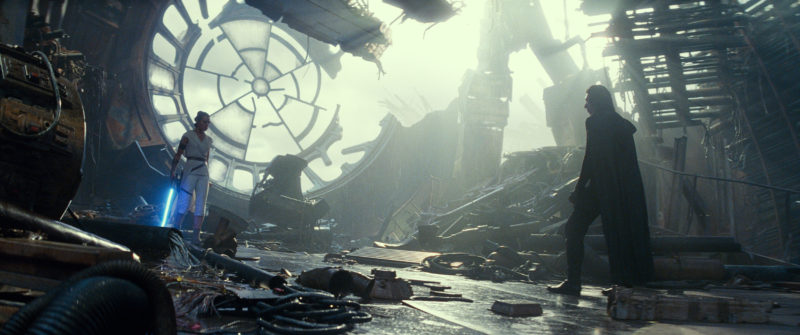
Yes, the message there is valuable. You are not who your parents or grandparents are. For Rey, a conscious decision needed to be made on whether she would follow in the footsteps and accept her true family, the family she’s been searching for this entire trilogy, or if she would reject that heritage and make her own name in the galaxy. She chooses the latter, and that is an excellent lesson, but it comes at the price of a story choice that just feels cheap and uninspired.
Perhaps this reveal would not have left the same taste in my mouth had Abrams clearly planned this from the beginning. There is no mention of Palpatine in The Force Awakens, he is mentioned by Luke briefly in The Last Jedi, and so the reveal that Rey is a Palpatine feels more like it was written out of shock value rather than a progression through the trilogy. Is this evidence that the sequel trilogy was not planned out in advance? Maybe, but that doesn’t make or break a trilogy. The original Star Wars trilogy was notoriously unplanned and single films changed constantly. But what this is more indicative of is that Abrams set up a bunch of questions in The Force Awakens that he never had answers to, and when he was called to answer them, he took the easy way out.
It’s honestly laughable that Abrams made the comment that Rian’s choices in The Last Jedi pushed him to be more daring and bold in The Rise of Skywalker. In fact, I see the opposite. If some fans disliked The Last Jedi for being too different and too bold, The Rise of Skywalker is the pendulum swinging the other way and suffering for the opposite reasons. It is full of easy choices that don’t challenge any characters outside of Rey and Ben, and a film chock full of nostalgia imagery to shush us all and tell us it will be okay. So, in reality, what is The Rise of Skywalker if not a lazy jaunt through a checklist of answers and fan service that isn’t worthy of its predecessor nor the Skywalker Saga as a whole? You tell me because that’s all I see.
RATING: C-

